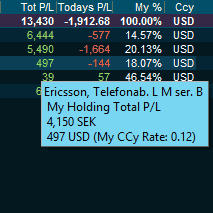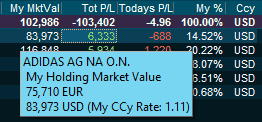Custom List



Custom List |



|
DescriptionThe Custom List window works in the same way as the Market Window. The main difference is that it is possible to add symbols from all markets you have access to. How to open
ListAdd symbols from any market you have access to using "+ Add", or open a saved list from the "Select List" drop-down. Symbol information - In order to get more information about a symbol, right-click on any row and choose an option from the right-click menu. Keyboard search - With the window selected, begin typing on your keyboard in order to search within the list. Once you press ENTER on your keyboard, the symbol will be displayed on the top of the custom list window. See "User Interface" to configure what should happen when you search in this window. Deleting symbolsRight click and choose Edit | Delete or user the keyboard shortcut (Del) to delete a symbol from the Custom List. Deleting Entire ListsOnce you have opened a saved list, right-click and choose Edit > Delete List to delete it. Adding Custom HeadlinesCustom headlines can be added by selecting Other > Add Headline from the right click menu.
The text and background color of all headlines can be customized in the "Edit colors and fonts" window tool menu. Notice that in a list with headlines, sorting by clicking on the column captions have been disabled. You can move symbols up or down your list by selecting it, and using the up and down arrows in the interface. Highlighting and modifying a symbolCustom Background color - Customize the background color for a symbol by right-clicking on an instrument and choosing Other > Symbol color from the right click menu.
To clear a custom background color, right-click on the symbol and choose Other > Clear Symbol color. Custom Symbol DescriptionIt is possible to define a custom description for a symbol by right clicking on the instrument and selecting Other > Custom Symbol description.
The custom description will also be used by other windows in Infront terminal, such as charts.
All custom descriptions are indicated with an asterisk (*). To remove a custom description, right-click on the symbol and select Other > Clear Custom Description. Ranking Rank today's winners, losers and symbols with highest turnover. Use "Source" in the menu to change between your custom list, or chains. ColumnsSelect Columns - If you would like to add, change or remove any of the data shown in a market window, custom list, or chain, right-click on a header and click "Select Columns". Sorting Columns - Sort by turnover, last price or any other column by double-clicking on the column headers. The list will automatically keep itself sorted.
Portfolio ViewKeep track of positions, and see P/L, Invested Value, Market Value and Totals in Portfolio View. Group assets by currency, asset class, sectors and your own holdings categories. Getting started with Portfolio viewOpen a new custom list from the main menu.
The invested amount and market value will be calculated automatically. Change to the "Results" layout to see performance. Pro tip: Calculate your average price, volumes and invested amount automatically by entering your desired weightings for each asset and then right-clicking in the window and choosing "Edit --> Distribute Amount". Pro tip: If you have illiquid OTC assets in your portfolio, use the "My Market Price" column, to enter a custom market price for the asset. It will be used to calculate the market value of your holdings (even if a last price for the instrument is available). You can add the column by using "Select Columns".
Group your holdingsYou can group your holdings in your portfolio from the drop-down menu called "Group By".
The chart will by default the same grouping as you have in the the Grid, but should you wish to group it by any other category, just right click on the chart and choose.
News and EventsYou will see news and events related to your instruments in the "News" and "Events" panel. You can customize the sources for your news by right-clicking in the panel and choosing "Sources". You can adjust the time period of upcoming events by right-clicking in the "Events" panel and choosing your desired period.
Advanced Portfolio ViewIn the Portfolio tab in the trading window, you will find a new button: "Advanced Portfolio View".
This will open up your entire trading portfolio in the custom list Portfolio view, allowing you to chart, group, see events and news related to your positions. |
| 1. | Open Your Custom List |
| 2. | Choose your Target Currency from the "Target ccy" menu. |
| 3. | Remove the tick-box for "Only Convert Summaries" in the "Target ccy" menu. |
All Instruments in Local Currency

All Instruments in USD

All instruments in EUR

All instruments in JPY

Smart hints allow you to see data both in the instrument's local currency, but also your target currency. We also provide the currency rate at which the price conversion was made giving you full transparency and control.
In the case below, we are looking at Ericsson's Total P/L. We have chosen the target currency as USD and see this as $497. But we can still see the Total P/L for Ericsson in SEK (4,150 SEK) when hovering over the value with the mouse. We also see that the currency rate used is 0.12.

Another example, this time with Market Value is Adidas. Below, we are looking at the Market Value, with the target currency set to USD. We see this as $83,973 in our holdings, but hovering over the value also gives us the EUR Market Value of the position in Adidas (75,710 EUR) with a currency conversion of 1.11.
